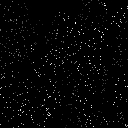 Fred's ImageMagick Scripts
Fred's ImageMagick Scripts
Copyright © Fred Weinhaus My scripts are available free of charge for non-commercial (non-profit) use, ONLY. For use of my scripts in commercial (for-profit) environments or non-free applications, please contact me (Fred Weinhaus) for licensing arrangements. My email address is fmw at alink dot net. If you: 1) redistribute, 2) incorporate any of these scripts into other free applications or 3) reprogram them in another scripting language, then you must contact me for permission, especially if the result might be used in a commercial or for-profit environment. Usage, whether stated or not in the script, is restricted to the above licensing arrangements. It is also subject, in a subordinate manner, to the ImageMagick license, which can be found at: http://www.imagemagick.org/script/license.php Please read the Pointers For Use on my home page to properly install and customize my scripts. |
|
Computes a pixel-by-pixel standard deviation or variance image from multiple input images. |
last modified: December 15, 2018
|
USAGE: stdimage [-m mode] [-c] infile1 ... infileN outfile
-m .... mode ...... output statistic; mode=s or std (for standard deviation) PURPOSE: To compute a pixel-by-pixel standard deviation or variance image from multiple input images. DESCRIPTION: STDIMAGE computes a pixel-by-pixel standard deviation or variance image from multiple input images. ARGUMENTS: -m mode ... MODE statistical measure generated in the output image. Choices are either mode=s or std (for standard deviation) or mode=v or var (for variance). The default=std. -c ... Apply contrast stretch to output. CAVEAT: No guarantee that this script will work on all platforms, nor that trapping of inconsistent parameters is complete and foolproof. Use At Your Own Risk. |
|
Standard Deviation Of Image Vs. Image With Noise |
||
|
Image |
Noisy Image |
Arguments: |

|

|

|
|
Standard Deviation Of Three Completely Different Images |
|||
|
Image 1 |
Image 2 |
Image 3 |
Arguments: |

|

|

|

|
|
What the script does is as follows:
This is equivalent to the following IM commands for
|